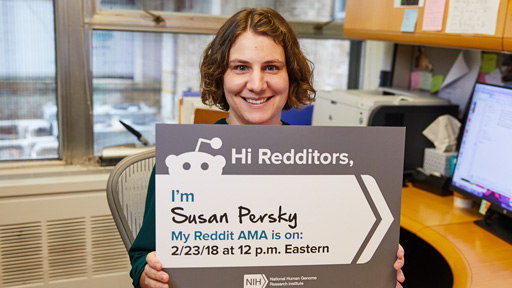Virtual Reality (VR), one of the most rapidly expanding areas of tech and gaming, is also playing important roles in the arenas of medicine and health - and for good reason! The ability to simulate experiences expands opportunities for researchers, clinicians and patients in ways that previously seemed limited to the imaginations of sci-fi writers. Patients can now reduce stress through VR experiences, doctors can practice surgical techniques through simulated experiences, and medical students can practice their bedside manner in different scenarios in a virtual world.
On February 23, 2018, the National Human Genome Research Institute (NHGRI) hosted a Reddit "Ask Me Anything" (AMA) with National Institutes of Health researchers who use VR to study a host of research questions.
Our hosts were Susan Persky, Ph.D., head of the Immersive Virtual Environment Testing Area (IVETA), and associate investigator in the Social Behavioral Research Branch at NHGRI; Patti Brennan, R.N., Ph.D., director, National Library of Medicine (NLM); Victor Cid, M.S., senior computer scientist, Disaster Information Management Research Center at NLM; John Ostuni, Ph.D., staff scientist, National Institute of Neurological Disorders and Stroke (NINDS); William Kistler, M.A., lab manager of IVETA at NHGRI; and Jeremy Swan, B.A., biovisualization specialist with the Computer Support Services Core at the Eunice Kennedy Shriver National Institute of Child Health and Human Development (NICHD).
The team received questions on using VR to improve how doctors interact with patients, the potential for such therapies to be helpful in other mobility disorders and the equity of VR technology across geographic locations. Here, we recap the event (or you can check out the full AMA here!)

From Jojuj3
How accessible might this technology be for people living in remote parts of low-income countries?
From National Institutes of Health Researchers
Hello, I'm John from NIH/NINDS. In many ways VR can be considered the great equalizer. For example, students can put on a VR headset and find themselves in a classroom with a highly skilled educator. The same educator that a non-rural, high-income student would experience. They can go on realistic fields trips and have experiences that normally would not be available to them. Unfortunately, VR is dependent on network access and I am concerned that this will limit the usefulness of VR for low-income, rural area.
Reddit users also asked questions about the benefits of VR for promoting a healthy lifestyle.
From BurgerInk
How could researchers use VR to encourage healthy behavior in the public or in patients?
From National Institutes of Health Researchers
This is Susan from NHGRI. This is an area with a lot of active research. In our lab, we've explored how VR education related to health risks can increase motivation to improve dietary and physical activity behavior. We've also developed a VR-based buffet as an outcome measure, but have an eye toward potential deployment as a tool to help parents practice making health choices for their children. Some of this research is available here. Beyond that, other researchers such as those at Stanford have developed situations where watching our avatars exercise or eat healthy foods have encouraged those behaviors in research participants. A really interesting new study shows that eating virtual doughnuts may help people feel satiated and reduce real doughnut eating afterward. This work is all still in the research phase, but certainly some companies are entering the space, too, with VR physical activity platforms. I'm less familiar with the evidence base there, but if people (or the technology) can get us past the sweaty VR displays, I could definitely see these being motivating. There are also several products related to relaxation, biofeedback and meditation. Relaxation, in particular, seems like a promising area for VR technology.
And finally, another user asked about VR for use in remote medicine.
From p1percub
Do you see a future where VR can be combined with telemedicine? Give the doctor the experience of being in the room with you?
From National Institutes of Health Researchers
Hi, this is Victor from NLM. Yes, I can. It will be some time until VR will be as good as a face-to-face meeting with your doctor, but for many purposes VR can provide enough tools for a doctor to do his/her job. VR can provide the same experience provided by today's telemedicine platforms (video, audio, haptics...) and also provide both, the doctor and the patient, with additional information/visualization tools that can enhance the remote interactions. Doctors can today collaborate doing surgery remotely via VR, for example (although the patient is not in VR). For instance, take a look around 13 minutes into this video: https://exponential.singularityu.org/medicine/an-avatar-in-your-o-r-redefining-human-interaction-in-surgery-with-shafi-ahmed/




